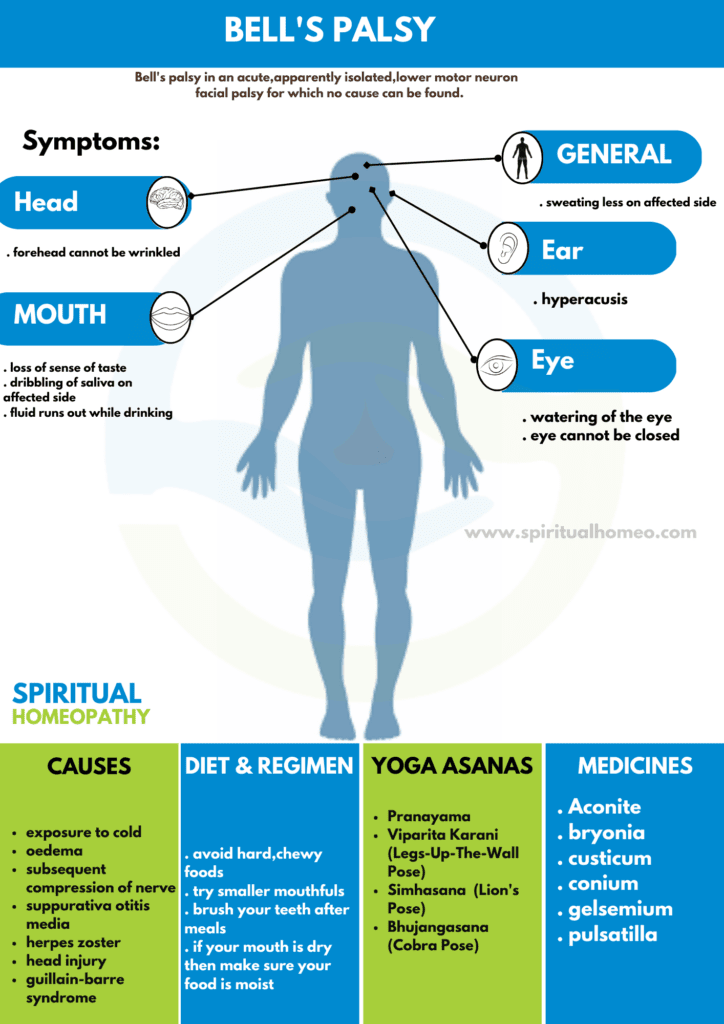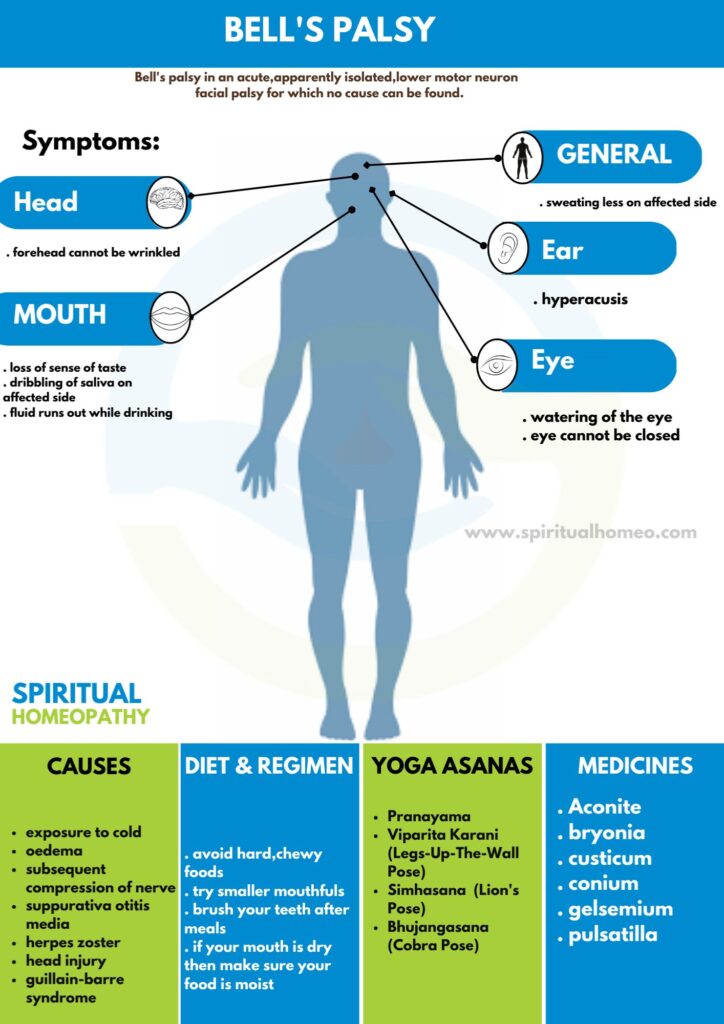Bell’s Palsy
Bell’s palsy is an acute, apparently isolated, lower motor neuron facial palsy for which no cause can be found.
- Overview
- Causes
- types
- Sign & Symptoms
- What to eat
- Diet and Regiment
- Homeopathic Treatment
- FAQ
- Reference
OVERVIEW
The most common form of facial paralysis is Bell’s palsy. The annual incidence of this idiopathic disorder is ~25 per 100,000 annually, or about 1 in 60 persons in a lifetime. Risk factors include pregnancy and diabetes mellitus. a lower motor neuron lesion of the 7th (facial) nerve, affecting all ages and both sexes.
CAUSES
(a) known clinical conditions – Diabetes, severe hypertension, last trimester of pregnancy, dental anesthesia.
(b) Causes – Associated
(i) Firstly, Exposure to cold; oedema and subsequent compression of nerve trunk within the rigid fallopian canal causes circulatory disturbance.
(ii) Secondly, Other important causes of acute facial palsy include suppurativa otitis media, herpes zoster, head injury, Guillain-Barre syndrome
TYPES
Bell’s palsy is primarily categorized based on its causes and severity:
- Classic Bell’s Palsy: The most common form, typically linked to viral infections like the herpes simplex virus, causing sudden facial paralysis on one side.
- Bilateral Bell’s Palsy: Rare, affecting both sides of the face simultaneously, often associated with more serious conditions like Lyme disease or viral infections.
- Recurring Bell’s Palsy: When the condition reoccurs in the same person, often with similar symptoms on one side of the face.
- Partial Bell’s Palsy: Where the facial paralysis is not complete, with some muscle control remaining.
All types involve facial weakness but vary in severity and underlying causes.
Signs:
Forehead
- Forehead cannot be wrinkled; frowning lost (especially, frontalis).
Eye
- Eye cannot be closed (e.g. orbicularis oculi, sphincter of palpebral fissure). On attempting closure, eyeball turns upwards and outwards (in other words, Bell’s phenomena).
teeth
- On showing the teeth, the lips do not separate on affected side. Whistling not possible. Articulation of labial components difficult. Nasolabial fold flattened out. Angle of mouth on affected side droops with dribbling of saliva (in case of Orbicularis oris, sphincter of oral fissure).
Cheek
- Cheek puffs out with expiration because of buccinators paralysis. Food collects between teeth and paralysed cheek. Even Fluid runs out while drinking (specifically in buccinators).
tongue
- Base of tongue lowered (stylohyoid and posterior belly of digastric).
WHAT TO EAT
For Bell’s palsy recovery, a nutritious diet can support nerve healing and reduce inflammation:
- Anti-inflammatory foods: Omega-3-rich foods like salmon, walnuts, and flaxseeds help reduce inflammation.
- Vitamin B12: Found in eggs, meat, and fortified cereals, B12 supports nerve regeneration and overall health.
- Vitamin C: Citrus fruits, bell peppers, and broccoli promote immune function and repair tissue.
- Magnesium-rich foods: Spinach, almonds, and bananas help muscle relaxation and reduce stress.
- Zinc: Foods like pumpkin seeds, beans, and seafood can aid tissue repair and immune function.
- Hydration: Drink plenty of water to stay hydrated and support overall health.
A balanced diet rich in these nutrients can assist in healing and recovery from Bell’s palsy.
DIET AND REGIMEN
For Bell’s palsy recovery, a balanced diet and regimen can support nerve healing:
Diet:
- Anti-inflammatory foods: Include omega-3-rich foods like salmon, walnuts, and flaxseeds to reduce inflammation.
- Vitamin B12: Found in meat, eggs, and fortified cereals to support nerve health and regeneration.
- Vitamin C: Citrus fruits, bell peppers, and broccoli help repair tissue and boost immunity.
- Magnesium: Leafy greens, almonds, and bananas help relax muscles and reduce stress.
- Zinc: Pumpkin seeds, beans, and seafood aid tissue repair.
Regimen:
- Physical therapy: Facial exercises to improve muscle control and reduce stiffness.
- Massage: Gentle massage around the affected area can promote blood flow.
- Adequate rest: Ensure sufficient sleep for nerve repair and overall health.
- Stress management: Practice relaxation techniques like meditation or yoga to reduce stress that could impede healing.
This combination of diet and regimen can support nerve recovery and reduce symptoms of Bell’s palsy.
HOMEOPATHIC TREATMENTS
Why Choose Spiritual Homeopathy?
At Spiritual Homeopathy, we offer a unique approach to healing that integrates traditional homeopathic principles with a deep understanding of the spiritual aspects of health. Our team of experienced homeopathic practitioners combines expertise with empathy, ensuring that you receive the highest standard of care tailored to your individual needs.
Our Approach to Treatment
We believe that true healing occurs when all aspects of a person—physical, emotional, and spiritual—are in balance. That’s why our treatment approach goes beyond simply addressing symptoms to identify and treat the underlying imbalances contributing to your health concerns. By addressing the root cause of illness and supporting your body’s innate healing ability, we empower you to achieve lasting health and vitality.
Services We Offer
Consultations: Our experienced best homeopathy doctors in Hyderabad offer comprehensive consultations to assess your health concerns, medical history, and individual needs.we also take online consultation and We take the time to listen to your story, understand your unique health goals, and develop personalized treatment plans tailored to your specific needs.
Remedies: At Spiritual Homeopathy, we provide a wide range of homeopathic remedies carefully selected to address a variety of health conditions. From acute ailments to chronic diseases, our remedies are safe, gentle, and effective, offering natural relief without the side effects often associated with conventional medications.
Follow-Up Care: We believe in the importance of ongoing support and monitoring throughout your healing journey. Our team is dedicated to providing regular follow-up care to track your progress, adjust treatment as needed, and ensure that you are on the path to optimal health and well-being.
Our Commitment to You
At Spiritual Homeopathy, your health and wellness are our top priorities. We are committed to providing you with compassionate care, personalized treatment, and the support you need to achieve your health goals. Whether you are seeking relief from a specific health concern or simply looking to optimize your overall well-being, we are here to support you every step of the way.
FAQ
What is Bell’s Palsy
Bell’s palsy is an acute, apparently isolated, lower motor neuron facial palsy for which no cause can be found.
Homeopathic Medicines used by Homeopathic Doctors in treatment of Bell’s Palsy
- Causticum
- Gelsemium
- Aconite
- Conium
- Bryonia
- Pulsatilla
What are the symptoms of Bell’s Palsy
- Postauricular pain
- Loss of sense of taste
- Hyperacusis and
- Watering of the eye
- Sweating less on affected side
What are the causes of Bell’s Palsy
- Diabetes, Severe hypertension
- Last trimester of pregnancy
- Dental anesthesia
- Exposure to cold
- Oedema
- Subsequent compression of nerve trunk
- Suppurativa otitis media
- Herpes zoster
- Head injury
REFFRENCE
[1]Harrison-s_Principles_of_Internal_Medicine-_19th_Edition-_2_Volume_Set
[2] Medicine Golwala
[3] Davidsons Principles and Practice of Medicine (PDFDrive.com)
[4] Medical Nutrition Therapy_ A Case Study Approach (PDFDrive)
[5] The Homoeopathic Prescriber by K. C. Bhanja
[7] Bell’s palsy physical examination – wikidoc




